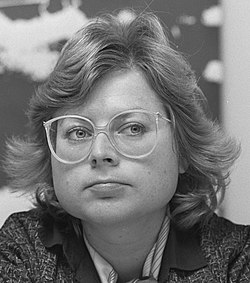The United Nations Development Programme (UNDP) is a United Nations agency tasked with helping countries eliminate poverty and achieve sustainable economic growth and human development. The UNDP emphasizes on developing local capacity towards long-term self-sufficiency and prosperity.

In the United Nations, the Millennium Development Goals (MDGs) were eight international development goals for the year 2015 created following the Millennium Summit, following the adoption of the United Nations Millennium Declaration. These were based on the OECD DAC International Development Goals agreed by Development Ministers in the "Shaping the 21st Century Strategy". The Sustainable Development Goals (SDGs) succeeded the MDGs in 2016.

Adrianus Petrus Wilhelmus "Ad" Melkert is a Dutch politician and diplomat of the Labour Party (PvdA) who has served as a Member of the Council of State since 20 January 2016.

Heidemarie Wieczorek-Zeul is a German politician and a member of the Social Democratic Party (SPD) since 1965.

Hilde Frafjord Johnson is a Norwegian politician from the Christian Democratic Party. She is a former Minister of International Development of Norway, and member of the Norwegian Government. She most recently served as the Special Representative of the Secretary-General and Head of the United Nations Mission in the Republic of South Sudan, completing her term in July 2014
The Grassington Millennium Project was an initiative that focused on detailing the organizational means, operational priorities, and financing structures necessary to achieve the Millennium Development Goals or (MDGs). The goals are aimed at the reduction of poverty, hunger, disease, illiteracy, environmental degradation, and Gender-Based Violence. At the United Nations Millennium Summit in September 2000 world leaders had initiated the development of the MDGs and set a completion date for the project of June 2005.
The Monterrey Consensus was the outcome of the 2002 Monterrey Conference, the United Nations International Conference on Financing for Development. in Monterrey, Mexico. It was adopted by Heads of State and Government on 22 March 2002.
The World Population Foundation (WPF) was founded in 1987 in the Netherlands by Diana and Roy W. Brown. Their purpose was to create an organisation to draw attention to the effects of high birth rates and rapid population growth on maternal and infant mortality, communities and the environment, and to raise funds for population projects and programmes, with the ultimate aim of reducing world poverty and improving the quality of life of the world's poorest people.
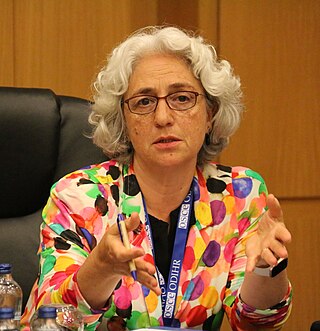
Farahnaz "Farah" Karimi is an Iranian-Dutch politician. She was a member of the House of Representatives of the Netherlands between 1998 and 2006 for GreenLeft. Since 2019 she has been a Senator for GreenLeft.
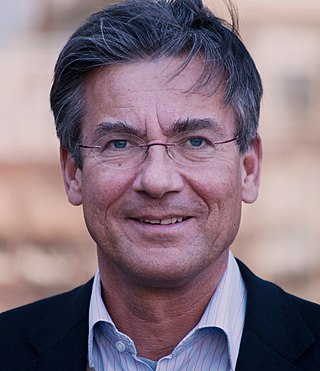
Maxime Jacques Marcel Verhagen is a retired Dutch politician and historian. A member of the Christian Democratic Appeal (CDA), he served as Deputy Prime Minister of the Netherlands from 2010 to 2012 under Prime Minister Mark Rutte.
The Society for International Development (SID) was founded in Washington, D.C., United States, in 1957.
The United Nations Sustainable Development Group (UNSDG), previously the United Nations Development Group (UNDG), is a consortium of 36 United Nations funds, programmes, specialized agencies, departments and offices that play a role in development. It was created by the Secretary-General of the United Nations in order to improve the effectiveness of United Nations development activities at the country level.

The United Nations Millennium Campaign (UNMC) was a UN campaign unit that was set up in response to the Millennium Declaration signed by 189 member states. Established in October, 2002, the UNMC aimed to increase support to achieve the Millennium Development Goals and seek a coalition of partners for action. The Millennium Campaign targets intergovernmental, government, civil society organizations and media at both global and regional levels.

María Fernanda Espinosa Garcés is an Ecuadorian linguist, poet, politician, and diplomat. She served as an advisor on biodiversity and indigenous peoples (1999-2005) and was the regional director for South America (2005-2007) at the International Union for Conservation of Nature (IUCN). Espinosa Garcés was Ecuador's Minister of Foreign Affairs twice, from 2007 to 2008 and then from 2017 to 2018. She also served as ambassador and permanent representative to the United Nations in New York (2008-2009) and Geneva (2014-2017), and as Ecuador's Minister of National Defense (2012-2014). In June 2018, she was elected President of the United Nations General Assembly for the 73rd session by a two-thirds vote of the member states. Espinosa Garcés became the fourth woman in the seventy-three-year history of the United Nations to be elected President of the General Assembly. Besides her political career, she is also a poet and essayist.
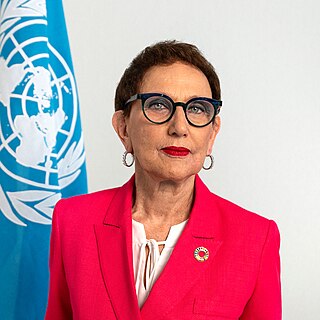
Rebeca Grynspan Mayufis is a Costa Rican economist who has been serving as Secretary-General of the UN Trade and Development (UNCTAD) since 13 September 2021.

Alhaji Dr. Kandeh Kolleh Yumkella is a Sierra Leonean agricultural economist, politician who served as a member of parliament and Chair of the Presidential Initiative on Climate Change, Renewable Energy and Food Security under President Julius Maada Bio's government. He is a public speaker, who addresses global issues, including poverty reduction, climate change, the Millennium Development Goals, and green industry and renewable energy. Dr.
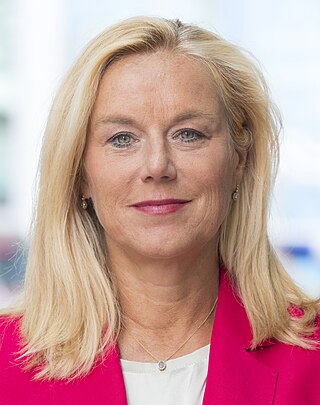
Sigrid Agnes Maria Kaag is a Dutch politician, humanitarian and diplomat who is the UN Senior Humanitarian and Reconstruction Coordinator for Gaza since 2024. Kaag most recently served in the fourth Rutte cabinet as First Deputy Prime Minister of the Netherlands and Minister of Finance from 2022 to 2024 and has previously served as Minister for Foreign Trade and Development Cooperation and Minister of Foreign Affairs. She was Leader of the Democrats 66 (D66) from 2020 to 2023.

Armenia was admitted into the United Nations on 2 March 1992, following its independence from the Soviet Union. In December 1992, the UN opened its first office in Yerevan. Since then, Armenia has signed and ratified several international treaties. There are 20 specialized agencies, programs, and funds operating in the country under the supervision of the UN Resident Coordinator. Armenia strengthened its relations with the UN by cooperating with various UN agencies and bodies such as the International Monetary Fund, the World Bank, the World Food Programme, and with the financial institutions of the UN. Armenia is a candidate to preside as a non-permanent member of the UN Security Council in 2031.
Azerbaijan has been a member in the United Nations since March 2, 1992, after the UN General Assembly admitted Azerbaijan at its 46th session. The Permanent Mission of the Republic of Azerbaijan was opened in New York City in May 1992. On October 29, 1991, soon after gaining independence from the Soviet Union, Azerbaijan applied to the UN General Assembly for joining the organization. Azerbaijan was elected as a non-permanent member of the UN Security Council for the term of 2012–2013.
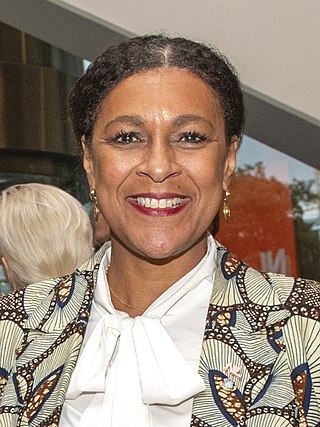
Jorien Wuite is a Sint Maarten-Dutch civil servant, diplomat, and politician. Born in The Hague, she moved to Sint Maarten aged 32 to work in government. She rose to the position of Minister of Education, Culture, Youth and Sports and served as Minister Plenipotentiary of Sint Maarten in the period 2018–19. She moved back to the European part of the Netherlands due to her election to the House of Representatives in 2021 as a member of the social liberal party Democrats 66 (D66).
